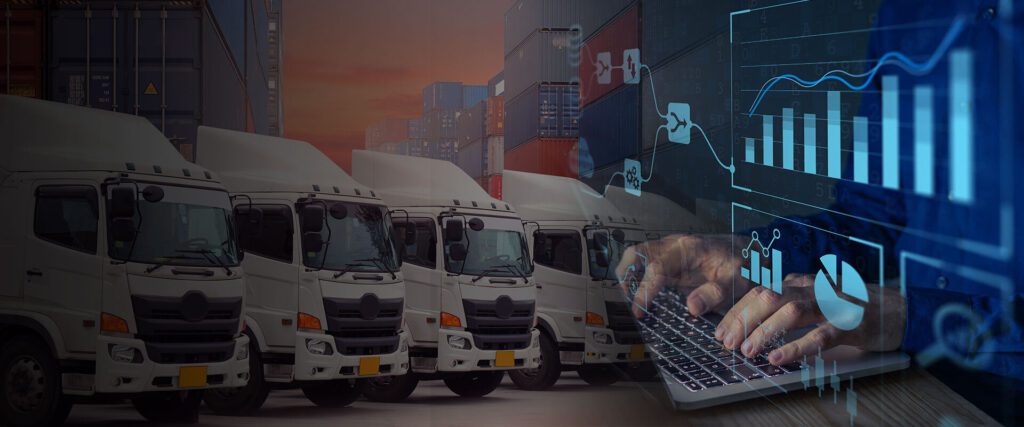How Transport Management System helps your Logistics Business Grow
You might know a thing or two about transport management systems (TMS) if you are associated with the logistics business. TMS focuses on creating efficiencies, improving logistics operations visibility, managing costs, and much more. This might be the right time to get yourself acquainted with the functions of transportation management systems in logistics as the global TMS market size is expected to grow to USD 17.8 billion by 2025, so why stay behind?
Before we get into transportation management system benefits, let’s talk about TMS and why you need it in the logistics business.
Transportation Management System (TMS)
The Transport Management System is implemented to improve the company’s structure and costs associated with freight movement. The system brings transparency to the product movement and makes it easier for the logistics business stakeholders to keep track.
The transportation system in logistics movement, configuration, implementation, cost, and functionality have improved the industry for buyers and stakeholders. Before Software-as-a-service (SaaS) cloud TMS, the acquisition, implementation, and ownership costs for TMS were very high, making it a viable option for only bigger companies.
SaaS TMS Cloud has allowed shipment companies of every size to access TMS for their business, which is why TMS sees explosive growth. We are expecting the industry to grow four times between today and 2025.
Why TMS?
The logistics industry has to keep up with the Amazon Effect. The traditional on-premise TMS finds it hard to go at the same pace. This is where SaaS cloud TMS is taken advantage of. In this age of instant gratification, when the consumer wants a thing and wants it now, TMS has provided a more cost-effective and efficient way. According to Peerless Research Group (PRG) survey 2020, 65% of shippers believe cloud TMS has helped them increase shipping transparency, close customer communication gaps, and help shippers maintain remote work capabilities during the pandemic.
According to Pitney Bowes report, the parcel shipment rates have been rising from 17% to 21% each year. This number almost doubled in the Covid times when the eCommerce industry boosted. The function of the transport management system in logistics is to simplify the complex logistics requirements. The choice of TMS has become crucial for the success of the logistics business today.
Logistics Challenges and One TMS Solution
Like every other industry, the logistics industry is confronting different challenges too. As covid struck globally, this industry saw significant changes as well, driven by tech innovations. The global outlook of transport management and logistics is quite optimistic as the innovations are moving the industry towards a better path. Meanwhile, let’s discuss the issues the logistics industry faces and how TMS is taking care of them:
- Transportation CostsLogistics services’ biggest cost concerns come from transportation that is 30% of the total costs. This cost can go up to 50% with an increase in fuel prices. The prices can go even higher depending on longer routes, traffic congestions, road restrictions, etc.
There are budget pressures from different directions that are also putting a dent in the pockets of investors.
The right transportation system in logistics management reduces shipping costs by 5% to 15%. It analyzes the financial aspects of every route and gives the most suitable and cost-effective solution. It works with analytics and comes up with an optimized system that reduces expenses.
- Fleet ManagementFleet management is often placed lower in the priority list when operations are also on the list. This low priority is understandable but is a high risk. Fleet only operates well when it is proactively maintained. Without proper maintenance, there are a lot of challenges that a logistics business can face. Like:
- Vehicles not being tracked can cause an increase in costs.
- Fluctuations in fuel costs can damage the whole budget.
- Environmental control can add new mandates that managers have to meet.
- The security of the fleet is another challenge that the budget has to suffer most of the time.
One of the main functions of the transportation management system in logistics is controlling the whole logistics processes at one stop. TMS adopts a digital approach and tracks all of the fleet in the system. It keeps the record of the fleet and all the maintenance issues related to the fleet.
All the environmental challenges faced by the fleet are also kept in record to take care of them on time. With proper tracking, the security of the fleet is never compromised.
- Improving Business ProcessesTaking care of the business processes manually can raise many difficulties for logistics operations. The manual keying and handling is highly time-consuming and needs more workforce to take care of it. The business often fails to keep track of real-time data insights leading to conflicts with their employees and customers.
Manual handling of the business processes can lead to fraudulent activities and hence can cause significant losses.
TMS helps the logistics business be the fastest and the most efficient one in the industry with automatic business process handling. With all the data being managed by the system, the company does not need more workforce to take care of the data. The logistics partners can look beyond just the operations handling and focus on their assigned tasks saving both time and money.
- Customer Service EnhancementToday, the market has become dynamic, and the customers expect more from the logistics company. The transportation processes have become more complex and even longer. Customers want their logistics company to solve their problems right away. Logistics businesses have to hire more and more people to cater to these needs, affecting the company’s budget.
With better analytics and monitoring capabilities under one system, TMS helps businesses provide better customer support. Suppliers can plan inventory levels and offer better customer services with a few clicks. TMS bridges the gap between order management and warehouse management systems and makes the processes smooth for customers.
- Logistics VisibilityLogistics visibility is essential when it comes to the logistics business. It is the ability to track each product component, starting from the supplier and reaching the consumer. Logistics businesses face the challenge of tracking each order which often results in the displacement of the order. In 2019, almost 50% of the consumers didn’t receive their orders and faced package theft or misplacement.
One of the most critical transportation management system benefits is transportation visibility. Advanced TMS provides a bird’s view of the entire system. It’s a huge plus to have this sort of operational visibility. Managers can find any issues that may arise on the way in time and quickly act on them.
Successful TMS implementation
Before you start incorporating a TMS into your logistics, you need to do your research on it. First, you need to make a requirement document that lists all the TMS features your business needs. Most common features that almost every logistics business needs are:
- Dispatch Management
- Compliance Management
- Driver Management
- Driver Mobile App
- Expense Management
- Fleet Management
- Invoicing Module
- CRM Module
- LTL Management
- Partners Integrations –
Add a weightage to each feature and make a priority list. Compare the list to the shortlisted TMS features, and if it matches, you’re good to go. Make sure you involve as many stakeholders in the selection process as possible to make a more informed decision on what TMS to choose. Involving more stakeholders will promote transparency and lead to better decisions.
Once the TMS selection is made, you need to bring in operations, manufacturing, warehousing, distribution, procurement, IT, sales, customer service, and finance into the next step. All these members should act as a board or committee that makes decisions about TMS and the features you need from the vendor. Once the whole board agrees with one solution, a superuser has to be introduced who will remain critical until the system goes live and even after.
A TMS for your Logistics Company
A transportation management system can be the arsenal for your logistics business, and what if we told you that we have just the right arsenal for you? A TMS with the same features as your priority list while staying cost beneficial? You might not believe our words, but you can see for yourself. LoadStop is transforming the trucking industry by digitizing and automating manual tasks, freight matching, and logistics processes. It is helping businesses track their compliance, maintenance, and invoicing throughout the transportation life cycle.
99% of LoadStop customers are satisfied with their solution and say that it helps them run their business pro-efficiently and proactively. Since the choice of a TMS is always yours, we encourage you to decide after you get complete knowledge of LoadStop TMS and not by just some suggestion.
You can book a demo with the LoadStop team at any time to get an understanding of their transportation management system and how it can merge into your logistics business right away. So, let’s get right to it. Book a demo here.



